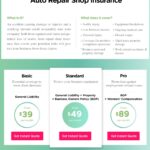When your car needs repairs after an accident, dealing with insurance companies can add stress to an already frustrating situation. A common question that arises is: Can I use any repair facility for car insurance claims? It’s crucial to understand your rights and the laws that protect you when it comes to choosing where your vehicle is repaired. Let’s delve into what you need to know.
Your Rights and the Choice of Repair Shop
Generally, yes, you have the right to choose your own repair facility when filing a car insurance claim. Many laws are in place to protect consumers and ensure fair practices in the auto repair industry. These regulations often stipulate that insurance companies cannot force you to use a specific repair shop.
This right is underpinned by consumer protection acts like the Automobile Repair Facilities Act, which, while specific to certain jurisdictions, embodies principles that are broadly applicable. Such acts aim to ensure transparency and protect customers from potentially unfair practices by repair facilities and, indirectly, by insurance companies trying to steer customers to preferred shops.
Getting a Written Estimate: Your Protection
One key aspect of these regulations is the requirement for repair facilities to provide a written estimate before commencing work. This is a crucial protection for consumers. According to established norms and laws, upon your request, a repair shop must give you a detailed written estimate outlining:
- The estimated cost of labor.
- The estimated cost of parts.
- A description of the problem or the work needed.
- The estimated completion time.
This written estimate empowers you to make informed decisions and prevents unexpected charges. Importantly, repair facilities are often restricted in how much they can exceed this estimate without your explicit authorization. For instance, charges exceeding the estimate by more than a certain percentage (e.g., 10% or 20% in some regions, especially for older vehicles) typically require your additional approval, either written or oral.
What if the Repair Costs Exceed the Estimate?
Laws are designed to protect you from runaway repair costs. If, during the repair process, the facility discovers additional work needed that will cause the cost to exceed the initial estimate significantly, they are obligated to seek your approval. They cannot simply proceed with the extra work and surprise you with a much larger bill. You have the right to authorize or refuse this additional work. This ensures you remain in control of the repair process and the associated expenses.
Invoice and the Right to Your Old Parts
Upon completion of the repairs, you are entitled to a written invoice detailing all work performed and the costs. This invoice must clearly separate charges for parts and labor. Furthermore, you generally have the right to request the return of replaced parts. This allows you to inspect the old parts and verify that the repairs were indeed necessary. There are exceptions, such as parts under warranty or core charges that need to be returned to the manufacturer, but these should be clearly explained.
Insurance Companies and Repair Shop Choices: Direct Repair Programs (DRPs)
While you have the right to choose your repair facility, insurance companies may have Direct Repair Programs (DRPs) or preferred shop networks. These are repair shops that have agreements with the insurance company, often promising certain service levels or cost controls.
Insurance companies may suggest or recommend you use a DRP shop, and they might highlight benefits like faster claims processing or guarantees on repairs. However, it’s important to remember:
- You are not obligated to use a DRP shop. Your policy likely states you can choose any licensed repair facility.
- Insurers cannot legally force you to use their preferred shops. Steering you too aggressively towards a DRP shop might even be considered “steering,” which is illegal in some areas.
Potential Pressure and Knowing Your Ground
Despite your legal rights, you might encounter subtle or overt pressure from insurance adjusters to use a DRP shop. They might imply using a non-DRP shop could lead to delays, complications, or uncovered costs. It’s important to stand firm and know your rights.
If you choose a non-DRP shop, the insurance company is still responsible for covering reasonable and necessary repair costs according to your policy and the damage assessment. They cannot deny your claim simply because you chose a shop outside their network.
In conclusion, while insurance companies may have preferred repair shops, you generally have the right to choose your own repair facility. Understanding your rights, requesting written estimates, and being informed about repair processes are crucial steps in navigating car insurance claims and ensuring your vehicle is repaired to your satisfaction. Always review your insurance policy and be aware of consumer protection laws in your specific location to be fully informed.

